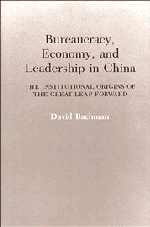Book contents
- Frontmatter
- Contents
- Preface
- Acknowledgments
- Chronology
- 1 Introduction
- Part I Historical background and conceptual approach
- Part II The institutional origins of the Great Leap Forward
- 4 The financial coalition
- 5 The planning and heavy industry coalition
- 6 The Party as agent of social transformation
- 7 The views of the top leadership
- 8 The Third Plenum of the Eighth Central Committee and the Great Leap Forward
- 9 Conclusions
- Appendix: The constraints on Mao
- Bibliography
- Index
5 - The planning and heavy industry coalition
Published online by Cambridge University Press: 21 March 2010
- Frontmatter
- Contents
- Preface
- Acknowledgments
- Chronology
- 1 Introduction
- Part I Historical background and conceptual approach
- Part II The institutional origins of the Great Leap Forward
- 4 The financial coalition
- 5 The planning and heavy industry coalition
- 6 The Party as agent of social transformation
- 7 The views of the top leadership
- 8 The Third Plenum of the Eighth Central Committee and the Great Leap Forward
- 9 Conclusions
- Appendix: The constraints on Mao
- Bibliography
- Index
Summary
The coalition of planning and heavy industrial organizations and leaders was on the political defensive in the fall of 1956. Overinvestment in capital construction was most pronounced in the heavy industrial sector. The small leap of 1956 served the interests of heavy industry by adding new fixed assets to that sector but also resulted in planners' losing control of economic activity. Since the small leap could not be sustained, planners felt it was imperative to restore order to economic processes. How, then, could they serve the interests of this coalition while responding effectively to the difficult economic environment of late 1956 and early 1957? Precisely at this time, the financial coalition was pressing its agenda of reform an financial control. This posed an additional challenge to the leaders of the planning coalition. Faced with the financial coalition's innovative program of economic change, incorporating the market and increased priority for financial indicators as methods of macroeconomic management, what was the planning coalition to do in order to regain its position at the center of state economic administration?
The answers to these questions formulated by the two top planners, Li Fuchun and Bo Yibo, and their associates would be both profound and disastrous. They too developed an innovative program, but it was based on self-reliance, industry aiding agriculture, emphasis on building more small and medium-size factories, and decentralization.
- Type
- Chapter
- Information
- Bureaucracy, Economy, and Leadership in ChinaThe Institutional Origins of the Great Leap Forward, pp. 96 - 132Publisher: Cambridge University PressPrint publication year: 1991
- 1
- Cited by



